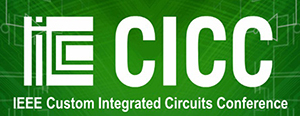Keynote
Monday, 14 April
8:50 am-9:40 am
Dr. Scott Hanson, Chief Technology Officer, Founder, Ambiq, USA
 Bio: Scott Hanson is the Chief Technology Officer and founder of Ambiq. Scott invented SPOT, Ambiq’s core sub-threshold technology platform, to enable the world’s most energy-efficient chips during his PhD studies at the University of Michigan. He founded Ambiq in 2010 and led the development of the world record-setting Apollo, Ambiq’s first flagship processor. Under Scott’s leadership, Ambiq has shipped more than 100 million chips to the world’s top brands and has grown into the global leader in ultra-low power solutions.
Bio: Scott Hanson is the Chief Technology Officer and founder of Ambiq. Scott invented SPOT, Ambiq’s core sub-threshold technology platform, to enable the world’s most energy-efficient chips during his PhD studies at the University of Michigan. He founded Ambiq in 2010 and led the development of the world record-setting Apollo, Ambiq’s first flagship processor. Under Scott’s leadership, Ambiq has shipped more than 100 million chips to the world’s top brands and has grown into the global leader in ultra-low power solutions.
In addition to his role as CTO, he has variously played roles leading product definition and development, managing production test, and, most importantly, spending a great deal of time with customers to understand their needs and their vision. As a widely recognized innovator in low power circuits, Scott today leads the development of Ambiq’s technology roadmap.
Scott’s pioneering work in sub-threshold design and picowatt processors has been widely published, with more than 30 leading publications, more than 20 patents on related technology, and a wide variety of speaking engagements. Scott’s work was honored by the University of Michigan with the 2014 Arbor Networks PhD Research Impact Award and the 2020 ECE Alumni Rising Star Award and was honored by Ernst & Young as an Entrepreneur of the Year 2020 finalist.
Title: AI at the Edge: Notes From the Field
Abstract: AI is driving an explosion of innovation that is quickly advancing from the cloud to the edge. This talk will cover the challenges — and opportunities for innovation — in edge AI based on real customer use cases.
Keynote Luncheon
*Pre-registration Required
Tuesday, 15 April
12:00 pm-1:30 pm
Prof. Peter Kinget, Bernard J. Lechner Professor of Electrical Engineering, Columbia University, USA
 Bio: Peter Kinget is the Bernard J. Lechner Professor of Electrical Engineering at Columbia University in New York. His research group focusses on the design of analog and RF integrated circuits and the novel systems or applications they enable in communications, sensing, computing, and power management. He devotes a lot of his energy to teaching initiatives like https://mosbius.org and https://vlsidesignlab.org.
Bio: Peter Kinget is the Bernard J. Lechner Professor of Electrical Engineering at Columbia University in New York. His research group focusses on the design of analog and RF integrated circuits and the novel systems or applications they enable in communications, sensing, computing, and power management. He devotes a lot of his energy to teaching initiatives like https://mosbius.org and https://vlsidesignlab.org.
He received his engineering and Ph.D. degrees in electrical engineering from the Katholieke Universiteit in Leuven (Belgium). He has worked in industrial research and development at Bell Laboratories, Broadcom, Celight and Multilink before joining the faculty of the Department of Electrical Engineering, Columbia University, NY in 2002. He served as Department Chair from 2017-2020. He is also a consulting expert on patent litigation and a technical consultant to industry.
Peter is a Fellow of the IEEE and is widely published. He received several awards including the IEEE Solid-State Circuits Society 2020 Innovative Education Award and the “2011 IEEE Communications Society Award for Advances in Communication” (for an outstanding paper in any IEEE Communications Society publication in the past 15 years). He is a “Distinguished Lecturer” for the IEEE Solid-State Circuits Society (SSCS), and has been an Associate Editor of the IEEE Journal of Solid State Circuits (2003-2007) and the IEEE Transactions on Circuits and Systems II (2008-2009). He has served on the program committees of many of the major solid-state circuits conferences and has been an elected member of the IEEE SSCS Adcom (2011-2013 & 2014-2016).
Title: Circuit Labs at the Lunch Table with MOSbius
Abstract: Learning integrated circuit design requires gaining a broad range of skills and knowledge including circuit analysis and design, signals & systems, applied electro-magnetics, and semiconductor physics. Learning theory has always been most accessible through books or now the internet. Simulation tools are now also widely available on personal computers, including open-source versions. But, learning measurements so far has been mostly confined to school or industry laboratories. Yet, physical intuition and practical experience keeps playing a significant role in the development of successful, high performance integrated circuits.
We will present the MOSbius platform that allows a student or designer to experiment with IC-style, analog, CMOS circuits at the lunch table. This unique platform uses a custom chip with CMOS building blocks that can be wired on a breadboard or with a programmable on-chip switch matrix. Measurements can be conducted using an affordable, all-in-one, USB lab instrument. Ready-to-go experiments are provided to learners and instructors on https://mosbius.org.
Nothing can substitute for the aha moment when you observe a circuit finally working. The debugging process to bring-up the circuit teaches the designer essential lessons that carry over to high performance circuits in highly scaled technologies. The MOSbius platform aims to make lab experience widely accessible and affordable to learners.
Wednesday Keynote
Wednesday, 16 April
8:50 am-9:40 am
 Samir Mittal, Corporate Vice President, Micron Technology, USA
Samir Mittal, Corporate Vice President, Micron Technology, USA
Bio: Samir leads AI in Silicon Systems Design and Advanced Memory Systems development at Micron Technology He guides Micron’s university engagements for systems and design. He is a member of the Dean’s Advisory Council for College of Engineering at The Ohio State University. As an executive champion of the Micron’s Center of Excellence at Georgia Institute of Technology, he serves on the advisory board of the Department of Computer and Electrical Engineering.
Prior to Micron, Samir founded SCUTI AI, a startup focused on next generation data center infrastructure for deep learning applications. Samir and the SCUTI team transitioned to Micron designing and developing data center persistent memory (3DXP) products where they launched the world’s fastest SSD in record time. Prior to SCUTI AI, Samir was VP of Engineering at SanDisk leading the industry transition to an All-Flash data center with full stack solutions. Samir also held senior leadership roles at Qumu Corporation delivering secure cloud services video products, and at Seagate Technology in hard disk drive-based storage products. Samir earned a doctorate from The Ohio State University, specializing in control systems and signal processing. He has been recognized by the university with the E.G. Bailey award for entrepreneurship as an outstanding alumnus.
Title: The role of Intelligent Memory in enabling the emergent era of Artificial Generalized Intelligence
Abstract: Since the release of GPT-4, the pursuit of Artificial General Intelligence (AGI) has been both steady and relentless. This talk explores key computing trends driving AGI development, using case studies in generative AI that showcase breakthroughs in engineering and research previously unattainable through human effort alone. Central to this progress are significant investments in AI infrastructure, supporting trillion-parameter models. As these models continue to improve, they are expected to accelerate innovations in computing paradigms and hasten the achievement of AGI.
A crucial aspect of this advancement is the ongoing development of memory systems that can support large models while addressing challenges associated with the “traditional memory wall” bottlenecks in AI computing. Intelligent memory is central to paving the way for future breakthroughs in system level design with innovation vectors in heterogenous integration, near memory compute, and memory disaggregation. A key aspect in this regard is the use of AI in Silicon and Systems Design to accelerate development timelines to the fastest possible speed.

